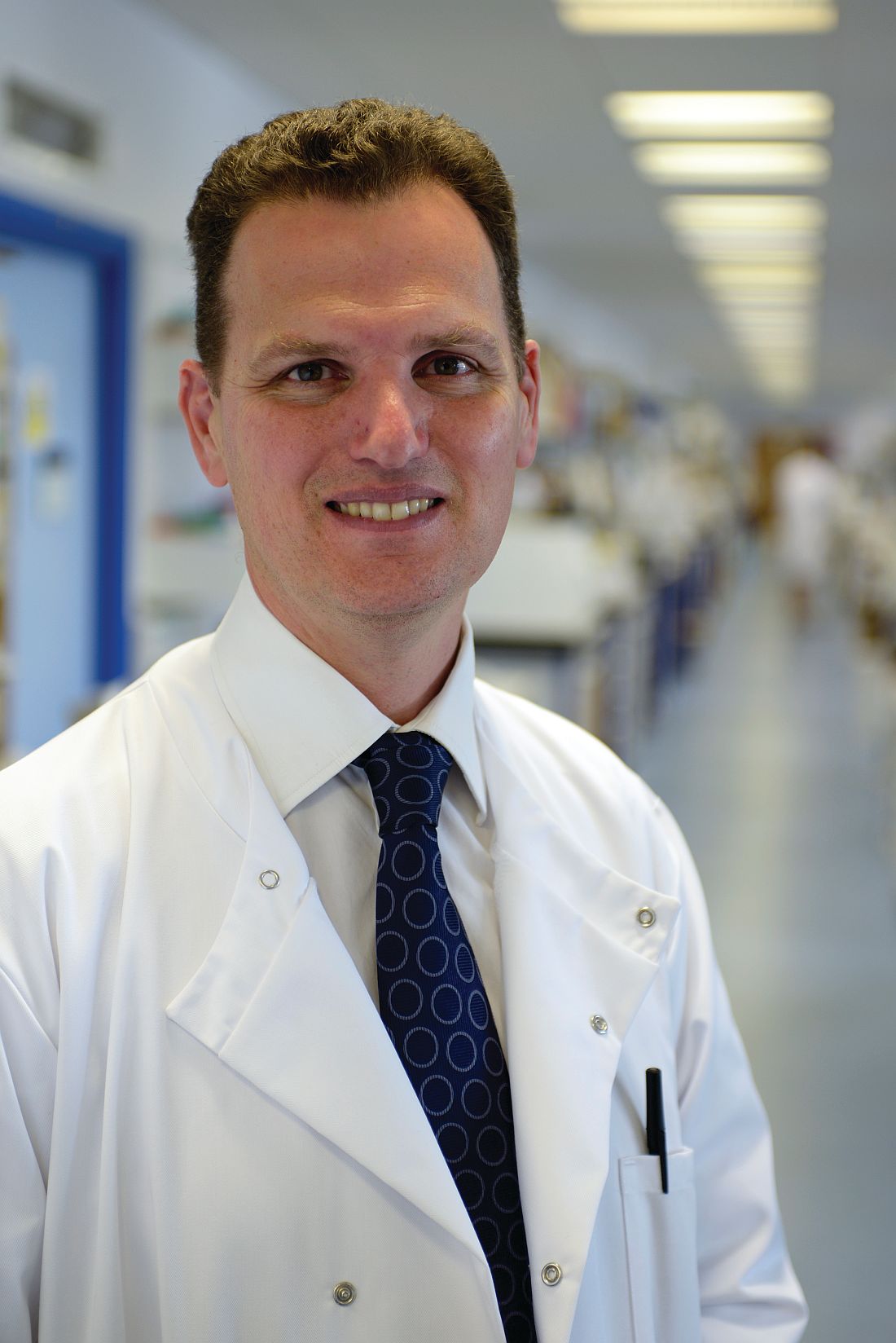User login
LAS VEGAS – Rheumatoid arthritis that is difficult to treat may occur in about 10% of patients with the disease. The definition of difficult-to-treat rheumatoid arthritis varies among experts, however, and the reasons for refractoriness are often unknown, said Iain McInnes, MD, PhD, professor of experimental medicine and director of the Institute of Infection, Immunity and Inflammation at the University of Glasgow and current president of the European League Against Rheumatism.
There may be an intrinsic refractory disease state, where the disease will manifest despite the use of any existing medications. Patients may have pharmacokinetic refractory disease, which could result from antidrug antibodies. There may be false positives. “It could well be that the patient is sore, but it is not because of the active inflammation,” he said. “It is because of biomechanical disease or pain sensitization. Or it could be that there is osteoarthritis.”
In the end, managing patients with difficult-to-treat rheumatoid arthritis may come down to setting reasonable expectations and addressing practical concerns, such as medication adherence, comorbidities, and adverse drug reactions – “the realpolitik of rheumatological care,” Dr. McInnes said at the annual Perspectives in Rheumatic Diseases held by Global Academy for Medical Education.
Defining difficult to treat
In a recently published study, Dr. McInnes and colleagues surveyed rheumatologists about what characterizes difficult-to-treat rheumatoid arthritis (Ann Rheum Dis. 2018 Dec;77[12]:1705-9).
“There was remarkable variation,” Dr. McInnes said. “Should fatigue be involved? Do the types of drugs that you have failed matter? Should a patient’s need for glucocorticoids be part of the definition? ... We did not really find much of a consensus.”
The presence of cardiovascular disease, extra-articular manifestations, infection, malignancy, diabetes mellitus, and other factors add to the challenge. “These are all very familiar problems that you face in your routine practice, whether you are in rheumatology care primarily or whether you are in family practice,” he said.
Although it is difficult to determine how many patients have refractory rheumatoid arthritis, “the rule of thumb is about 10%,” Dr. McInnes said. Using data from the British Society for Rheumatology Biologics Register for Rheumatoid Arthritis, researchers estimated that approximately 6% of patients would be refractory to a biologic drug, defined as patients who move on to a third class of biologic therapy (Ann Rheum Dis. 2018 Oct;77[10]:1405-12).
The same study found that, in recent years, patients have cycled through drugs more quickly than they had in the past. Many patients prove difficult to treat within 4 or 5 years, “which is pretty terrifying with a disease whose median age of onset is early 50s, but whose clinics are full of people in their teens, 20s, and 30s,” Dr. McInnes said.
Approaches to treatment
New medications, therapeutic targets, and treatment approaches eventually may help treat or prevent refractory disease. In the meantime, it may be beneficial to “go back to the beginning” when caring for patients with difficult-to-treat rheumatoid arthritis, Dr. McInnes said. “Make absolutely certain that we understand what is going on in that patient. Even just the opportunity to go through the disease course is reassuring for our patients. If nothing else, it tells them that we are listening, paying attention, and we are taking it seriously.”
Physicians may need to recognize the presence of antidrug antibodies. In addition, medication adherence may be a problem. About one-third of patients who are prescribed methotrexate do not take the medication, which may be a difficult topic for them to discuss, he said.
“Detect that inflammation which is there and treat it,” Dr. McInnes said. “And detect that which is not of an inflammatory origin and manage it on its own merits.”
Dr. McInnes is a consultant for AbbVie, Boehringer Ingelheim, Bristol-Myers Squibb, Celgene, Eli Lilly, Galvani, GlaxoSmithKline, Leo Pharma, Novartis, Pfizer, and UCB. He has received grant or research support from AstraZeneca, Bristol-Myers Squibb, Compugen, GlaxoSmithKline, Janssen, Novartis, Pfizer, and UCB.
Global Academy for Medical Education and this news organization are owned by the same parent company.
LAS VEGAS – Rheumatoid arthritis that is difficult to treat may occur in about 10% of patients with the disease. The definition of difficult-to-treat rheumatoid arthritis varies among experts, however, and the reasons for refractoriness are often unknown, said Iain McInnes, MD, PhD, professor of experimental medicine and director of the Institute of Infection, Immunity and Inflammation at the University of Glasgow and current president of the European League Against Rheumatism.
There may be an intrinsic refractory disease state, where the disease will manifest despite the use of any existing medications. Patients may have pharmacokinetic refractory disease, which could result from antidrug antibodies. There may be false positives. “It could well be that the patient is sore, but it is not because of the active inflammation,” he said. “It is because of biomechanical disease or pain sensitization. Or it could be that there is osteoarthritis.”
In the end, managing patients with difficult-to-treat rheumatoid arthritis may come down to setting reasonable expectations and addressing practical concerns, such as medication adherence, comorbidities, and adverse drug reactions – “the realpolitik of rheumatological care,” Dr. McInnes said at the annual Perspectives in Rheumatic Diseases held by Global Academy for Medical Education.
Defining difficult to treat
In a recently published study, Dr. McInnes and colleagues surveyed rheumatologists about what characterizes difficult-to-treat rheumatoid arthritis (Ann Rheum Dis. 2018 Dec;77[12]:1705-9).
“There was remarkable variation,” Dr. McInnes said. “Should fatigue be involved? Do the types of drugs that you have failed matter? Should a patient’s need for glucocorticoids be part of the definition? ... We did not really find much of a consensus.”
The presence of cardiovascular disease, extra-articular manifestations, infection, malignancy, diabetes mellitus, and other factors add to the challenge. “These are all very familiar problems that you face in your routine practice, whether you are in rheumatology care primarily or whether you are in family practice,” he said.
Although it is difficult to determine how many patients have refractory rheumatoid arthritis, “the rule of thumb is about 10%,” Dr. McInnes said. Using data from the British Society for Rheumatology Biologics Register for Rheumatoid Arthritis, researchers estimated that approximately 6% of patients would be refractory to a biologic drug, defined as patients who move on to a third class of biologic therapy (Ann Rheum Dis. 2018 Oct;77[10]:1405-12).
The same study found that, in recent years, patients have cycled through drugs more quickly than they had in the past. Many patients prove difficult to treat within 4 or 5 years, “which is pretty terrifying with a disease whose median age of onset is early 50s, but whose clinics are full of people in their teens, 20s, and 30s,” Dr. McInnes said.
Approaches to treatment
New medications, therapeutic targets, and treatment approaches eventually may help treat or prevent refractory disease. In the meantime, it may be beneficial to “go back to the beginning” when caring for patients with difficult-to-treat rheumatoid arthritis, Dr. McInnes said. “Make absolutely certain that we understand what is going on in that patient. Even just the opportunity to go through the disease course is reassuring for our patients. If nothing else, it tells them that we are listening, paying attention, and we are taking it seriously.”
Physicians may need to recognize the presence of antidrug antibodies. In addition, medication adherence may be a problem. About one-third of patients who are prescribed methotrexate do not take the medication, which may be a difficult topic for them to discuss, he said.
“Detect that inflammation which is there and treat it,” Dr. McInnes said. “And detect that which is not of an inflammatory origin and manage it on its own merits.”
Dr. McInnes is a consultant for AbbVie, Boehringer Ingelheim, Bristol-Myers Squibb, Celgene, Eli Lilly, Galvani, GlaxoSmithKline, Leo Pharma, Novartis, Pfizer, and UCB. He has received grant or research support from AstraZeneca, Bristol-Myers Squibb, Compugen, GlaxoSmithKline, Janssen, Novartis, Pfizer, and UCB.
Global Academy for Medical Education and this news organization are owned by the same parent company.
LAS VEGAS – Rheumatoid arthritis that is difficult to treat may occur in about 10% of patients with the disease. The definition of difficult-to-treat rheumatoid arthritis varies among experts, however, and the reasons for refractoriness are often unknown, said Iain McInnes, MD, PhD, professor of experimental medicine and director of the Institute of Infection, Immunity and Inflammation at the University of Glasgow and current president of the European League Against Rheumatism.
There may be an intrinsic refractory disease state, where the disease will manifest despite the use of any existing medications. Patients may have pharmacokinetic refractory disease, which could result from antidrug antibodies. There may be false positives. “It could well be that the patient is sore, but it is not because of the active inflammation,” he said. “It is because of biomechanical disease or pain sensitization. Or it could be that there is osteoarthritis.”
In the end, managing patients with difficult-to-treat rheumatoid arthritis may come down to setting reasonable expectations and addressing practical concerns, such as medication adherence, comorbidities, and adverse drug reactions – “the realpolitik of rheumatological care,” Dr. McInnes said at the annual Perspectives in Rheumatic Diseases held by Global Academy for Medical Education.
Defining difficult to treat
In a recently published study, Dr. McInnes and colleagues surveyed rheumatologists about what characterizes difficult-to-treat rheumatoid arthritis (Ann Rheum Dis. 2018 Dec;77[12]:1705-9).
“There was remarkable variation,” Dr. McInnes said. “Should fatigue be involved? Do the types of drugs that you have failed matter? Should a patient’s need for glucocorticoids be part of the definition? ... We did not really find much of a consensus.”
The presence of cardiovascular disease, extra-articular manifestations, infection, malignancy, diabetes mellitus, and other factors add to the challenge. “These are all very familiar problems that you face in your routine practice, whether you are in rheumatology care primarily or whether you are in family practice,” he said.
Although it is difficult to determine how many patients have refractory rheumatoid arthritis, “the rule of thumb is about 10%,” Dr. McInnes said. Using data from the British Society for Rheumatology Biologics Register for Rheumatoid Arthritis, researchers estimated that approximately 6% of patients would be refractory to a biologic drug, defined as patients who move on to a third class of biologic therapy (Ann Rheum Dis. 2018 Oct;77[10]:1405-12).
The same study found that, in recent years, patients have cycled through drugs more quickly than they had in the past. Many patients prove difficult to treat within 4 or 5 years, “which is pretty terrifying with a disease whose median age of onset is early 50s, but whose clinics are full of people in their teens, 20s, and 30s,” Dr. McInnes said.
Approaches to treatment
New medications, therapeutic targets, and treatment approaches eventually may help treat or prevent refractory disease. In the meantime, it may be beneficial to “go back to the beginning” when caring for patients with difficult-to-treat rheumatoid arthritis, Dr. McInnes said. “Make absolutely certain that we understand what is going on in that patient. Even just the opportunity to go through the disease course is reassuring for our patients. If nothing else, it tells them that we are listening, paying attention, and we are taking it seriously.”
Physicians may need to recognize the presence of antidrug antibodies. In addition, medication adherence may be a problem. About one-third of patients who are prescribed methotrexate do not take the medication, which may be a difficult topic for them to discuss, he said.
“Detect that inflammation which is there and treat it,” Dr. McInnes said. “And detect that which is not of an inflammatory origin and manage it on its own merits.”
Dr. McInnes is a consultant for AbbVie, Boehringer Ingelheim, Bristol-Myers Squibb, Celgene, Eli Lilly, Galvani, GlaxoSmithKline, Leo Pharma, Novartis, Pfizer, and UCB. He has received grant or research support from AstraZeneca, Bristol-Myers Squibb, Compugen, GlaxoSmithKline, Janssen, Novartis, Pfizer, and UCB.
Global Academy for Medical Education and this news organization are owned by the same parent company.
EXPERT ANALYSIS FROM PRD 2019

